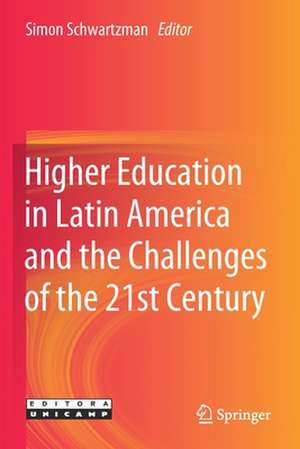Higher Education in Latin America and the Challenges of the 21st Century
Editat de Simon Schwartzmanen Limba Engleză Paperback – 30 mai 2021
The boom of Latin American higher education is analyzed in this contributed volume by leading experts from the region. They discuss the causes and consequences of this massive expansion and the challenges they pose for different stakeholders such as governments, private entrepreneurs, teachers, researchers, students, policy makers, educational managers and many other social groups. Topics discussed in the volume include:
- Massive expansion of tertiary enrollment in Latin America
- Expansion of private higher education
- Proliferation of new kinds of institutions, different from the classic university model
- The challenge of developing quality assurance and accreditation systems
- Internationalization of academic research and teaching in Latin America
- The challenge of integrating academic research and technological innovation
| Toate formatele și edițiile | Preț | Express |
|---|---|---|
| Paperback (1) | 634.18 lei 6-8 săpt. | |
| Springer International Publishing – 30 mai 2021 | 634.18 lei 6-8 săpt. | |
| Hardback (1) | 640.37 lei 6-8 săpt. | |
| Springer International Publishing – 30 mai 2020 | 640.37 lei 6-8 săpt. |
Preț: 634.18 lei
Preț vechi: 746.09 lei
-15% Nou
Puncte Express: 951
Preț estimativ în valută:
121.37€ • 126.24$ • 100.19£
121.37€ • 126.24$ • 100.19£
Carte tipărită la comandă
Livrare economică 12-26 aprilie
Preluare comenzi: 021 569.72.76
Specificații
ISBN-13: 9783030442651
ISBN-10: 3030442659
Ilustrații: XVI, 152 p. 20 illus., 17 illus. in color.
Dimensiuni: 155 x 235 mm
Greutate: 0.25 kg
Ediția:1st ed. 2020
Editura: Springer International Publishing
Colecția Springer
Locul publicării:Cham, Switzerland
ISBN-10: 3030442659
Ilustrații: XVI, 152 p. 20 illus., 17 illus. in color.
Dimensiuni: 155 x 235 mm
Greutate: 0.25 kg
Ediția:1st ed. 2020
Editura: Springer International Publishing
Colecția Springer
Locul publicării:Cham, Switzerland
Cuprins
1. Higher Education and the Challenges of the 21st century: An introduction.- 2. New Challenges for Tertiary Education in the 21st century.- 3. The Transformation of Higher Education in Latin America: From Elite Access to Massification and Universalisation.- 4. The Diffusion of Policies for Quality Assurance in Latin America: The Interplay Between International Trends and Domestic Conditions.- 5. Expanding Access and Improving Equity in Higher Education: The National Systems Perspective.- 6. Privatization of Higher Education in Brazil: Old and New Issues.- 7. Return Scientific Mobility and the Internationalization of Research Capacities in Latin America.- 8. Technological Innovation and the "Third Mission" of Universities.
Notă biografică
Simon Schwartzman is an Associate Researcher at the Instituto de Estudos de Política Econômica/ Casa das Garças in Rio de Janeiro, and a member of the Brazilian Academy of Sciences. He studied sociology and political science at the Federal University of Minas Gerais and the Latin American School of Social Sciences (FLACSO, Chile), and holds a PhD in political science from the University of California, Berkeley. He was professor of Political Science and scientific director of the Research Center on Higher Education at USP between 1990 and 1994, and President of the Brazilian National Statistical Office (IBGE) between 1994 and 1998. He is the author of, among others, A Via Democrática: Como o Desenvolvimento Econômico e Social Ocorre no Brasil (Elsevier, 2014); Brasil: A Nova Agenda Social (with Edmar Bacha, Editores). Rio de Janeiro, LTC, 2011; and Políticas educacionais e coesão social : uma agenda latino-americana (with Cristian Cox), Rio de Janeiro, Elsevier; São Paulo: iFHC, 2009.
Textul de pe ultima copertă
This book presents an overview of the region with one of the fastest growing higher education sectors in the world. Until the beginning of the 1980s, universities were restricted to the elites in Latin American countries, with less than 5 million students enrolled in its courses. In the last four decades, however, the region went through a boom of higher education institutions and now has more than 25 million students enrolled in more than 3,800 universities – approximately 10% of all students enrolled in higher education courses in the world with four times more higher education institutions than Europe.
The boom of Latin American higher education is analyzed in this contributed volume by leading experts from the region. They discuss the causes and consequences of this massive expansion and the challenges they pose for different stakeholders such as governments, private entrepreneurs, teachers, researchers, students, policy makers, educational managers and many other social groups. Topics discussed in the volume include:
The boom of Latin American higher education is analyzed in this contributed volume by leading experts from the region. They discuss the causes and consequences of this massive expansion and the challenges they pose for different stakeholders such as governments, private entrepreneurs, teachers, researchers, students, policy makers, educational managers and many other social groups. Topics discussed in the volume include:
- Massive expansion of tertiary enrollment in Latin America
- Expansion of private higher education
- Proliferation of new kinds of institutions, different from the classic university model
- The challenge of developing quality assurance and accreditation systems
- Internationalization of academic research and teaching in Latin America
- The challenge of integrating academic research and technological innovation
Caracteristici
Presents an overview of the boom of higher education in Latin America in the last decades Brings together contributions from leading experts from the region Offers in depth analyses of topics such as the challenges of access expansion and quality assurance, internationalization of research and integration between research and technological innovation
